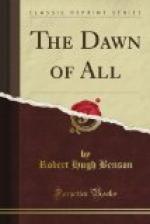Here at least they were an orderly population, going in and out of the houses, visiting in one corner of the square the vast general store that had been provided beforehand, presenting their pledges, which, at any rate for the present, were to take the place of the European money that the emigrants had brought with them.
He halted the car here, and leaning forward, began to look round him carefully.
The first thing that struck him was a negative emotion—a sense that something external was lacking. He presently perceived what this was.
In European towns, one of the details to which he had become by now altogether accustomed was the presence, in every street or square at which he looked, of some emblem or statue or picture of a religious nature. Here there was nothing. The straight pavements ran round the square; the straight houses rose from them, straight-windowed and straight-doored. All was admirably sanitary and clean and wholesome. He could see through the windows of the house opposite which his car was drawn up the clean walls within, the decent furniture, and the rest. But there was absolutely nothing to give a hint of anything beyond bodily health and sanitation and decency. In London, or Lourdes, or Rome there would at least have been a reminder—to put it very mildly—of other possibilities than these: of a Heavenly Mother, a Suffering Man; a hint that solid animal health was not the only conceivable ideal. It was a tiny detail; he blamed himself for noticing it. He reminded himself that here, at any rate, was real liberty as he had conceived it.
He began to scrutinize the faces of the passers-by, sheltering himself behind his elbow that he might not be noticed—appearing as if he were waiting for some one. Women passed by, strong-faced and business-like; men came up and passed, talking in twos or threes. He even watched for some while a couple of children who sat gravely together on a doorstep. (That reminded him of the meeting of to-morrow, when certain educational matters had to be finally decided; he remembered the proposed curriculum, sketched out in some papers that he had to study this evening—an exceedingly sound and useful curriculum, calculated to make the pupils satisfactorily informed persons.)
Again and again he told himself that it was fancy that made him see in the faces of these people—people, it must be remembered, who were not commonplace, but rather enthusiasts for their cause, since they preferred exile to a life under the Christian system—that made him see a kind of blankness and heaviness corresponding to that which the aspect of their street presented. Many of the faces were intellectual, especially of the men—there was no doubt of that; and all were wholesome-looking and healthy, just as this little square was sensibly built and planned, and the houses soundly constructed.




